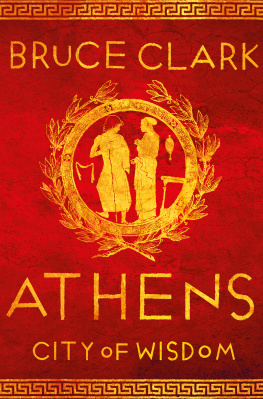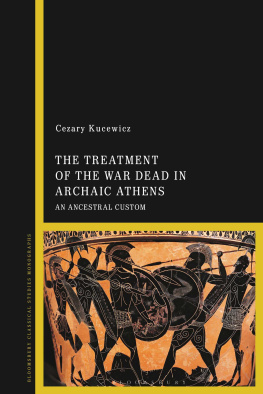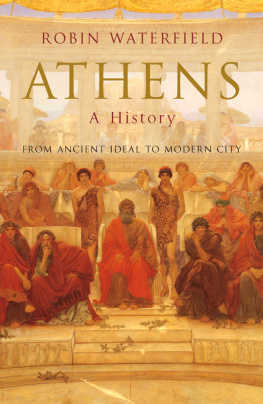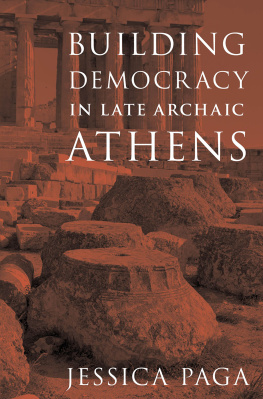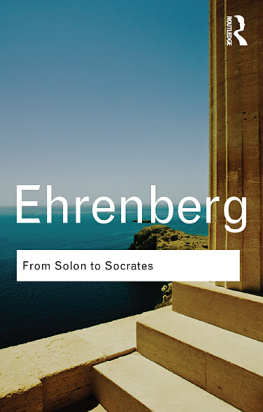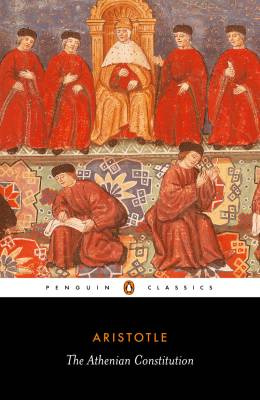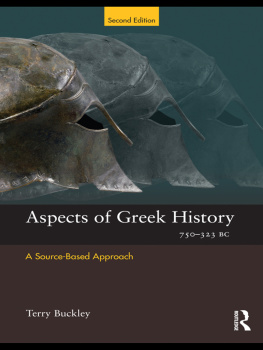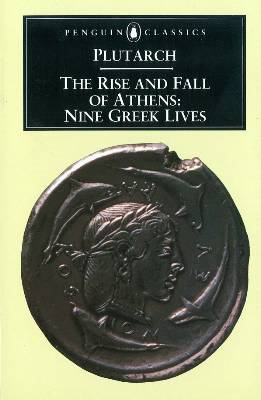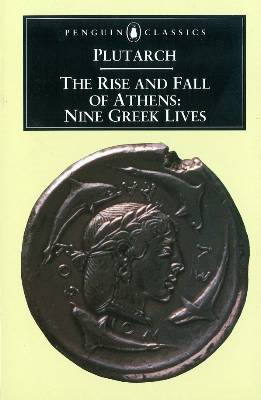Solon - Solon the Thinker: Political Thought in Archaic Athens
Here you can read online Solon - Solon the Thinker: Political Thought in Archaic Athens full text of the book (entire story) in english for free. Download pdf and epub, get meaning, cover and reviews about this ebook. City: London, Athens (Greece), Greece--Athens, year: 2013, publisher: Bloomsbury Academic, genre: Science. Description of the work, (preface) as well as reviews are available. Best literature library LitArk.com created for fans of good reading and offers a wide selection of genres:
Romance novel
Science fiction
Adventure
Detective
Science
History
Home and family
Prose
Art
Politics
Computer
Non-fiction
Religion
Business
Children
Humor
Choose a favorite category and find really read worthwhile books. Enjoy immersion in the world of imagination, feel the emotions of the characters or learn something new for yourself, make an fascinating discovery.

- Book:Solon the Thinker: Political Thought in Archaic Athens
- Author:
- Publisher:Bloomsbury Academic
- Genre:
- Year:2013
- City:London, Athens (Greece), Greece--Athens
- Rating:4 / 5
- Favourites:Add to favourites
- Your mark:
- 80
- 1
- 2
- 3
- 4
- 5
Solon the Thinker: Political Thought in Archaic Athens: summary, description and annotation
We offer to read an annotation, description, summary or preface (depends on what the author of the book "Solon the Thinker: Political Thought in Archaic Athens" wrote himself). If you haven't found the necessary information about the book — write in the comments, we will try to find it.
Solon: author's other books
Who wrote Solon the Thinker: Political Thought in Archaic Athens? Find out the surname, the name of the author of the book and a list of all author's works by series.
Solon the Thinker: Political Thought in Archaic Athens — read online for free the complete book (whole text) full work
Below is the text of the book, divided by pages. System saving the place of the last page read, allows you to conveniently read the book "Solon the Thinker: Political Thought in Archaic Athens" online for free, without having to search again every time where you left off. Put a bookmark, and you can go to the page where you finished reading at any time.
Font size:
Interval:
Bookmark:
Solon the Thinker
Political Thought in Archaic Athens
John David Lewis

Bloomsbury Academic
An imprint of Bloomsbury Publishing Plc
50 Bedford Square | 1385 Broadway |
London | New York |
WC1B 3DP | NY 10018 |
UK | USA |
www.bloomsbury.com
First published in 2006 by Gerald Duckworth & Co. Ltd.
First paperback edition 2008
John David Lewis 2006
John David Lewis has asserted his right under the Copyright, Designs and Patents Act,
1988, to be identified as Author of this work.
All rights reserved. No part of this publication may be reproduced or transmitted in any
form or by any means, electronic or mechanical, including photocopying, recording, or
any information storage or retrieval system, without prior permission in writing from
the publishers.
No responsibility for loss caused to any individual or organization acting on or refraining
from action as a result of the material in this publication can be accepted by Bloomsbury
or the author.
British Library Cataloguing-in-Publication Data
A catalogue record for this book is available from the British Library.
eISBN-13: 978-1-4725-2114-9
Library of Congress Cataloging-in-Publication Data
A catalog record for this book is available from the Library of Congress.
Typeset by Ray Davies
Articles reflecting research used in this book include:
Slavery and Lawlessness in Solonian Athens, in Dike 7 (2005): 19-40.
The Intellectual Context of Solons Dike, in Polis 18.1&2 (2001): 3-26.
Dike, Moira, Bios and the Limits to Understanding in Solon, 13 (West), in Dike 4 (2001): 113-35.
Earlier formulations presented at conferences:
Slavery and Lawlessness in Solonian Athens, Law and Public Order in Ancient Societies Panel, Colloquium on Ancient Law, The American Philological Association Annual Meeting, New Orleans, 5 January 2002.
Political Thought in Ancient Greece, Second Renaissance Conference, Palo Alto, California, 5-10 July 2002.
The Horoi and the Bridge between the 4th and 6th Centuries, Place and Genre in Greek Epigraphy Conference, University of Cambridge, January 1999.
The research grew out of my PhD dissertation at the University of Cambridge. A dissertation, however, is ones final college paper, and few certainly not mine should become books. This book draws from the research, but is completely re-written. In the research I received patient help from Paul Cartledge, Paul Millett, Dorothy Thompson, Pat Easterling and many others, none of whom has seen the book. Thank you to Mary Beard for the chance to sit in the Museum of Classical Art and Archaeology in Cambridge, under the statue of the Sunium Kouros. Regular tea with A.J. Graham and Harold Mattingly, Jr, was like sitting between Zeus, who sees all, and Prometheus, who never hesitates to share the fire of his intellect.
I value the material and intellectual support that the Anthem Foundation for Objectivist Scholarship offered towards the pursuit of intellectual values and this book. I appreciate Ashland Universitys use of an Anthem Foundation grant to allow me course release so early in my academic career. I thank Fred Miller and Robert Mayhew for their kind words and comments, and Ed Harris for the chance to participate in the APA Panel. Thanks to Sean Templeton, who proofread it. I am especially indebted to C. Bradley Thompson for his encouragement, and for his example of one who understands his principles and stands by them. I edited the paperback edition while a visiting scholar at the Social Philosophy and Policy Center, Bowling Green State University.
Most of all, to my wife Casey, I owe more than I can write or say. I am so glad she had a chance to run off to Nice for a month, while I contemplated the sculptures in the Cambridge Classics Library.
Latinized forms of Greek names are used throughout the text, for ease of reading.
Attic forms of Greek terms are given, except where quoting from Solon or referring directly to his verses. For instance, I use Dusnomi because that is Solons form (and capitalized as such), but in discussing it I may compare it to anomia. Thus in some cases the Attic and Ionian forms may be mixed in a single sentence.
In the bibliography and citations, the cited date refers to the date of the edition used, not necessarily the original date of publication.
Poems and fragments of Solon and other archaic poets are numbered as by M.L. West, Studies in Greek Elegy and Iambus. Ancient authors are generally abbreviated as in LSJ.
CAH = Cambridge Ancient History
DK = H. Diels and W. Kranz, Die Fragmente der Vorsokratiker
FGrH = F. Jacoby, Die Fragmente der Griechischen Historiker
HCT = A.W. Gomme, A Historical Commentary on Thucydides
IESS = D.L. Sills, The International Encyclopedia of the Social Sciences
IG = Inscriptiones Graecae (Berlin, 1873-)
KA = R. Kassel and C. Austin, Poetae Comici Graeci
LSJ = H.G. Liddell, R. Scott and S. Jones, A Greek-English Lexicon
KRS = G.S. Kirk, J.E. Raven and M. Schofield, The Presocratic Philosophers
MW = R. Merkelbach and M.L. West, Fragmenta Hesiodea
OED = Oxford English Dictionary (2nd edn, 1991)
PMG = D.L. Page, Poetae Melici Graeci
Smyth = H.W. Smyth, Greek Grammar
A short time will show the townsmen whether I am crazy,
with the truth coming out into the middle
Solon 10
The purpose of this book is to examine the poetic fragments of Solon as early Greek political thought. The focus is on Solons preserved poetry, not on laws or institutional reforms attributed to him by later writers, and not on his place in a literary or historical tradition. What rises out of Solons verses is an all-embracing way of looking at his world a way of understanding Athens and the men in it, of grasping the certainty of justice and the arbitrariness of fate, and of judging rulers both bad and good that is rooted in a new world-view that was sweeping the Aegean world. His preserved verses, even though fragmentary, often cast in epic form, and motivated by an opaque rhetorical purpose, nevertheless present an enlightened frame of reference, an energetic moral programme and a well-organized set of ideas. His words mark the birth of thought about the polis as a lawful, just community.
Solon, selected as chief official of Athens around 594 BC, is one of the most revered figures in Greek history.approach, but one that is surprisingly controversial: we must look at everything Solon says about these ideas, in all of his fragments. Solon is not an extension of a genre he is a person in his own right, with a distinct point of view, who should be read as such.
There has been an exciting revival of interest in Solon over the past five years, and a plethora of full-length studies dedicated to his poems.
Next pageFont size:
Interval:
Bookmark:
Similar books «Solon the Thinker: Political Thought in Archaic Athens»
Look at similar books to Solon the Thinker: Political Thought in Archaic Athens. We have selected literature similar in name and meaning in the hope of providing readers with more options to find new, interesting, not yet read works.
Discussion, reviews of the book Solon the Thinker: Political Thought in Archaic Athens and just readers' own opinions. Leave your comments, write what you think about the work, its meaning or the main characters. Specify what exactly you liked and what you didn't like, and why you think so.

